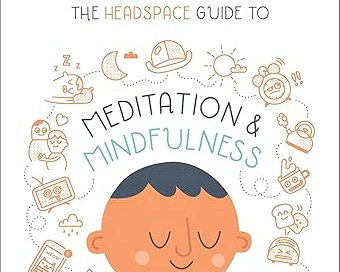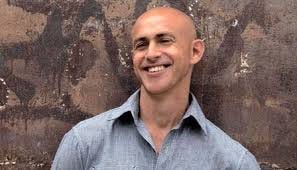Headspace founder on "taming" your mind (#80)
Andy Puddicombe relays one of the most helpful anecdotes I've heard for not only training the mind, but training anything
“My mind is like a racing engine,” said Sherlock Holmes, “tearing itself to pieces because it is not connected up with the work for which it was built.”
Is there a way to throttle back that engine? Stop it from tearing itself to pieces?
Nearly 20 years before launching Headspace— the billion dollar meditation app— Andy Puddicombe was trying to answer that question. He was in search his own, as he put it, “quiet empty mind.”
After a series of traumatizing events in his life,1 Puddicombe left the UK in 1994 to become a monk. After getting sworn in to a Tibetan monastery, he traveled the world studying and teaching mindfulness, and eventually returning to the UK in 2004. From there, he started the private meditation practice that led to the launch of the app in 2012.
In his book, The Headspace Guide to Meditation and Mindfulness, Puddicombe discusses this story, and some of the subsequent research and practice behind the app, but what I found most impactful were the stories Puddicombe picked up along the way from Tibetan masters.
One in particular left an impression on me that far transcends mindfulness into skill-building, wealth accumulation, and just living in general.
And it’s the subject of today’s OGT.
How to tame a wild horse (and your mind)
The stories Andy collected from master meditators he would often pull from, and they would always help bring him back to the present moment. One in particular, I found most impactful and wide ranging.
It’s about how to tame a wild horse:
"Have you ever seen a wild stallion broken in?" he asked.
"Now, imagine you grab hold of one of these horses and try to keep it in one place," he continued.
"Impossible!" he blurted out, "no man or woman can hold down a wild horse, it's too strong. Even if you got together with all your friends you'd never be able to hold it down in one place. This is not the way to tame a wild horse. When you first catch one of these horses," he continued, "you need to remember that they are used to running free. They're not used to standing still for a long time, or being forced against their will to stay in one place."
"Your mind is like this wild horse when you sit to meditate," he said, "you can't expect it to stay still in one place all of a sudden just because you're sitting there like a statue doing something called meditation! So when you sit down with this wild horse, this wild mind, you need to give it lots of room. Rather than trying to immediately focus on the object of meditation, give your mind time to settle, to relax a little.
What's the hurry?"
The story started to sink in for Andy. He was rushing to try to get to some final state—what that state was, however, eluded him. The teacher continues:
“Instead,” he suggested, “approach your mind in the same way that these wild horses are broken in. Imagine you’re standing in the middle of a really big space, a large open field. Now the horse is on the end of a slack of rope that you’re holding onto, but it has all the space it needs. It doesn’t feel it’s being trapped or pinned down in anyway.”
“Now place one hand over the other and very gently shorten the length of the rope by bringing it in a bit. Not by much, but just a little bit.” He held his thumb and forefinger up, just half a centimeter between them, as if to emphasize the point.
“If you do this gently enough with a wild horse, it won’t even notice the difference—it will still feel as though it has all the space in the world. Keep doing this, slowly bringing the horse closer, all the while keeping an eye on it, but giving it enough space to feel at ease and not too nervous.”
“So,” he said, “this is what you need to do with your mind when you sit down and find it’s very busy. Take it slowly, be gentle and give it all the space that it needs. Allow the horse to come to a natural place of rest, where it feels happy, confident and relaxed staying in one place. Sometimes it might struggle at first, but that’s fine, just loosen the rope again slightly, and gently repeat the process. If you meditate in this way then your mind will be very happy.”
The OGT: Everything is a wild horse
I’m not saying I’m Mr Skills, but everything I’ve ever improved at works like the horse.
You think you should jerk the rope, but the opposite method is correct. You should reel in the “horse”—whatever it is— slowly, imperceptibly, not even against it’s will.
You can see this by inverting it—examining how bad things happen, or you lose a skill. It often occurs in the same exact manner: not all at once, but over time, like drops of rain on the side of a mountain. One drop does nothing. One year, one decade—barely a mark. But centuries of drops will drill a hole through granite.
People gain weight light this. It’s a few pounds—usually around the holidays—every year, until it’s year 10, you’ve gained 25 pounds, and you’re wondering how. “The fall of Rome, like her rise…was not an event but a process spread over 300 years,” wrote historian Will Durant. “Some nations have not lasted as long as Rome fell.”
And so it is with accumulating anything of significance. It seems to be the rule for gaining mindfulness, but it’s also true to develop a strong comedy routine, a three-point shot, even a huge bank account.
Warren Buffett was once interviewed by Jeff Bezos on stage.
Bezos was puzzled. Here you have the most successful investor of all time and his time-tested philosophy is very public and simple to grasp. So, why wasn’t this philosophy more popular?
“Warren,” Bezos said, “your investing strategy seems so simple, so why don’t more people copy it?” Buffett paused, and then came up with a “wild horse” slogan:
“Because no one wants to get rich slow.”
There are few things, I’ve found, that this does not apply to. Write this phrase on your bathroom mirror: Get ___ slow.
Then fill in the blank with your dreams.
In one horrifying event, a group of his friends was plowed into by the truck of a drunk driver on Christmas Eve. Many died.





